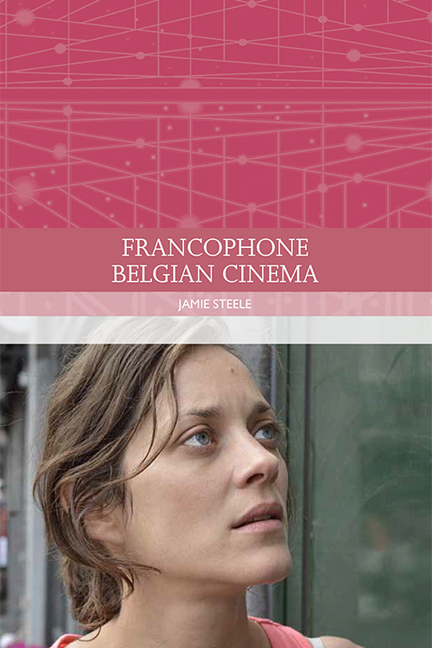Book contents
- Frontmatter
- Contents
- List of Figures
- Acknowledgements
- Traditions in World Cinema
- Introduction: Regional/National/Transnational Debates in Francophone Belgian Cinema
- 1 The (Francophone) Belgian Film Ecosystem: Trends in Production, Distribution and Exhibition
- 2 ‘No Future’: Social Marginalisation, Social Precariousness and Depictions of Seraing in Le gamin au vélo (Jean-Pierre and Luc Dardenne, 2011) and Deux jours, une nuit (Jean-Pierre and Luc Dardenne, 2014)
- 3 ‘Stills’ and Fragmented Families: Contemplating the Private Sphere in Joachim Lafosse’s Wallonia
- 4 From Slag Heaps to Cliffs: The ‘Marked’ Regional Landscape in Cages (Olivier Masset-Depasse, 2006)
- 5 The Francophone Belgian Road Movie: Eldorado (Bouli Lanners, 2008) and Ultranova (Bouli Lanners, 2005)
- 6 Lucas Belvaux’s Return: The Thriller Genre and Heists in Liège
- Conclusion
- Works Cited
- Films Cited
- Index
Conclusion
Published online by Cambridge University Press: 29 April 2021
- Frontmatter
- Contents
- List of Figures
- Acknowledgements
- Traditions in World Cinema
- Introduction: Regional/National/Transnational Debates in Francophone Belgian Cinema
- 1 The (Francophone) Belgian Film Ecosystem: Trends in Production, Distribution and Exhibition
- 2 ‘No Future’: Social Marginalisation, Social Precariousness and Depictions of Seraing in Le gamin au vélo (Jean-Pierre and Luc Dardenne, 2011) and Deux jours, une nuit (Jean-Pierre and Luc Dardenne, 2014)
- 3 ‘Stills’ and Fragmented Families: Contemplating the Private Sphere in Joachim Lafosse’s Wallonia
- 4 From Slag Heaps to Cliffs: The ‘Marked’ Regional Landscape in Cages (Olivier Masset-Depasse, 2006)
- 5 The Francophone Belgian Road Movie: Eldorado (Bouli Lanners, 2008) and Ultranova (Bouli Lanners, 2005)
- 6 Lucas Belvaux’s Return: The Thriller Genre and Heists in Liège
- Conclusion
- Works Cited
- Films Cited
- Index
Summary
On a conceptual level, this book considers francophone Belgian cinema, and the notion of a devolved Walloon cinema, through the lens of two complementary notions of cinematic transnationalism and regional cinema. By adopting a scalar approach to global and local understandings of films, and eschewing the dialectical form of the ‘glocal’ (which has also been offered as an alternative conceptual model within debates in the context of small national cinemas), this book highlights the complexities, issues and concerns with ‘the concept of national cinema’ (Higson 1989), that is, the national alone is not entirely sufficient for better understanding the varieties of francophone Belgian cinema. As Ledo contends, it is possible to ascertain that the nation operates as merely ‘a starting point for analysis’ for a cinematically small nation (2017). However, for Elsaesser, the sub-state and the supra-national are complementary and competing notions that avoid the national, as well as foregrounding the need to consider distinct films and cinemas in a regional context (Elsaesser 2005: 116–19). The knot between the sub-state and the supra-state is tied within the context of the European Union, which actively encourages the development of the local and the regional within a post-national European context (2005: 116–17). Belgium sits within these interstices with notions of ‘allegiance’ (2005: 120) extant within the linguistic communities, as analysed in the Introduction, the engagement with the forms of Belgian nationalism, and the TV drama Bye Bye Belgium. The transnational, and the supra-national, remain salient through the industrial analysis of francophone Belgian filmmaking.
Prior to 2017, francophone Belgian cinema had not been canonised in a formal and holistic manner. A push by the CCA on the fiftieth anniversary of the Royal Decree of 1967 has provided a neat and coherent starting point for a process of ‘self-selectivity’ (offered by Christie (2013)). However, it obfuscates filmmaking that preceded this time within the regions of Wallonia, Bruxelles- Capitale and Flanders that pertain to each of their cultural specificities and ethnolinguistic nationalisms. It also overlooks films that have become enmeshed in an intertextual dialogue among contemporary filmmakers, such as Misère au Borinage and Déjà s’envole la fleur maigre's stylistic filiation with the films of Bouli Lanners, Olivier Masset-Depasse, the Dardenne brothers and, as Gabriel (2011) posits, Benoît Mariage.
- Type
- Chapter
- Information
- Francophone Belgian Cinema , pp. 178 - 185Publisher: Edinburgh University PressPrint publication year: 2018



